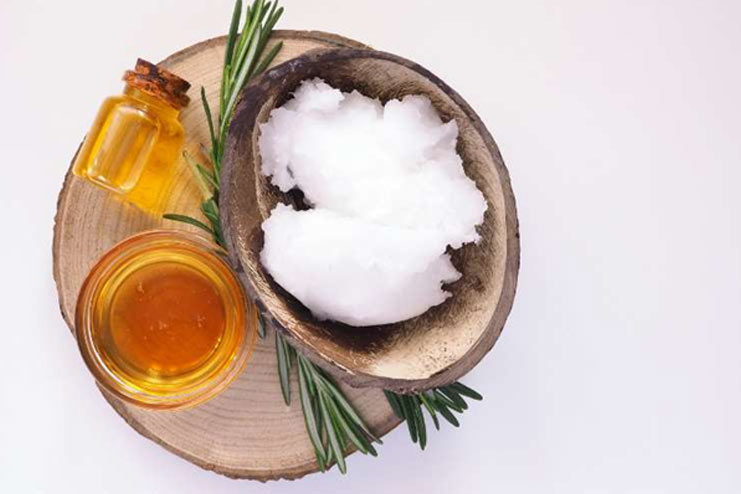Affiliate Disclaimer
Some links in this article are affiliate links. We may earn a small commission if you make a purchase through these links, at no extra cost to you. We only recommend products we find useful to our readersAtopic dermatitis, also known as eczema, is a chronic skin condition marked by red, irritated, and itchy skin patches. Dryness, swelling, and irritation are common symptoms that make living difficult for people who experience them. Coconut oil has become a well-liked natural therapy because of its remarkable moisturizing and anti-inflammatory qualities. To help manage and relieve the symptoms of this chronic skin condition, this article will examine seven efficient ways to use coconut oil for eczema relief.
Why Coconut Oil is Beneficial for Eczema
When it comes to treating eczema, coconut oil is an effective natural therapy because of its particular qualities. While its anti-inflammatory characteristics relieve irritation and reduce swelling, its antimicrobial activities assist in preventing infections that can occur when the skin is injured or inflamed. Other benefits include reducing edema and reducing irritation. In addition, coconut oil is a good moisturizer since it is abundant in medium-chain fatty acids such as lauric acid. These acids can permeate the skin and give deep hydration while also restoring the skin’s natural barrier.
Studies and experts’ opinions support these benefits. According to the findings of a Healthline survey, virgin coconut oil dramatically improved skin hydration and significantly reduced eczema symptoms. Another study published in the journal Dermatitis demonstrated that the coconut oil is just as effective as the mineral oil in treating any mild to moderate atopic dermatitis. In addition, dermatologists advocate coconut oil because of its soft and natural approach to skincare, making it an appropriate choice for managing eczema symptoms for some people.
The 7 Effective Ways to Use Coconut Oil for Eczema
1: Direct Application

First, cleanse the skin with a mild, fragrance-free cleanser, and pat dry before applying coconut oil directly to the affected areas of eczema. Using a small scoop, melt a small amount of coconut oil between your palms. Ensure the oil is applied evenly and thoroughly by gently massaging it into the affected areas. Apply oil twice daily, once in the morning and before bed, for optimal effects. After a bath, coconut oil can intensify its moisturizing properties because the warm water expands the skin’s pores, facilitating deeper penetration. Regular use can aid in hydrating the skin, reducing inflammation, and relieving irritation.
2: Coconut Oil and Essential Oils Blend

Blending coconut oil with essential oils enhances its advantages for eczema. To create this combination, combine ten drops each of tea tree and lavender oils with 1 cup of melted coconut oil. Lavender oil relaxes, while tea tree oil has antibacterial qualities. The blend should be kept in a glass container. Use a tiny amount and gently massage it into the afflicted areas of the skin. Apply this mixture once or twice every day. This mixture facilitates skin healing, lowers inflammation, and guards against infection.
3: Coconut Oil Bath

Add warm water and half a cup of melted coconut oil to your bathtub. Shake the water to distribute the oil evenly. Allow your skin to absorb the hydrating and soothing benefits of the coconut oil by soaking it in the bath for fifteen to twenty minutes. After taking a bath, gently pat your skin dry to keep the moisture in. This approach effectively manages eczema symptoms by moisturizing and relaxing inflamed skin.
4: Coconut Oil and Honey Mix

Blend one tablespoon of raw honey and one tablespoon of coconut oil until the two are entirely incorporated. Because of its natural antibacterial characteristics, honey can effectively prevent infections in eczema-prone skin. Apply a combination of honey and coconut oil to the affected areas and leave it on for twenty to thirty minutes before washing it off with warm water. Repeat this procedure once or twice per day. This combination helps protect, hydrate, and soothe the skin, leading to a more rapid healing process.

5: Coconut Oil and Aloe Vera Gel

Add melted coconut oil and aloe vera gel and combine in a bowl, ensuring proportions are equivalent to one another.. Apply the mixture to the areas that are afflicted, and massage it into the skin in a gentle manner. To achieve the best possible effects, apply this medication twice daily. The combination of these ingredients is quite effective for treating eczema because it helps to reduce inflammation, calm irritation, and speed up the skin’s healing process.
6: Coconut Oil and Oatmeal Paste

First, grind half a cup of oatmeal into a powder and then mix it with a quarter cup of melted coconut oil to produce the paste. Apply the paste to problematic areas and let it sit for fifteen to twenty minutes before rinsing it with warm water. The oatmeal gently exfoliates dead skin cells, while the coconut oil hydrates and calms the treated skin. Employ this treatment two to three times each week for optimal outcomes.
7: Coconut Oil as a Moisturizer

When used as a daily moisturizer, coconut oil can help prevent eczema flare-ups. When you are finished taking a shower or bath, pat your skin dry and apply a thin layer of coconut oil all over your body. Target areas that are prone to eczema. By forming a barrier that prevents moisture from escaping, the oil helps maintain the skin’s moisture levels throughout the day. Using coconut oil as a moisturizer consistently can assist in preserving the natural barrier of the skin, lessen the severity of dryness, and lower the likelihood of eczema flare-ups, all of which contribute to the skin’s general health.
Tips for Using Coconut Oil Safely
Even though coconut oil is entirely safe for most individuals, it is important to be aware of the possibility of allergic reactions. It is crucial to perform a patch test before applying coconut oil to a broad skin region. You should use a small amount of coconut oil in a discrete location, such as the inside of your wrist or elbow. Check for any irritation, redness, or itching after twenty-four hours. If there is no reaction, it is safe to use it on more significant parts of the skin plagued by eczema.
To achieve the best possible outcomes, selecting the appropriate variety of coconut oil is essential. Choosing virgin or cold-pressed coconut oil is the best option since these types of coconut oil contain more useful natural nutrients and qualities. Avoid refined or hydrogenated coconut oils entirely since they may contain additives or have been processed in a way that reduces their effectiveness. Because it is less likely to cause irritation and more likely to give the soothing and moisturizing advantages that are necessary for the management of eczema, virgin coconut oil of high quality is a better choice.
Conclusion
Using coconut oil to treat eczema has many advantages because of its antibacterial, anti-inflammatory, and hydrating qualities. These characteristics aid in calming irritation, lowering inflammation, and moisturizing the skin, all of which expedite the healing process. You can use coconut oil in your skincare routine through direct application, mixes with essential oils, calming baths, and various formulations. We invite you to experiment with these techniques to experience coconut oil’s natural comfort.
-
Nov 2018Written by Somapika D
-
Aug 2024Edited by Ankita
In this Article






















